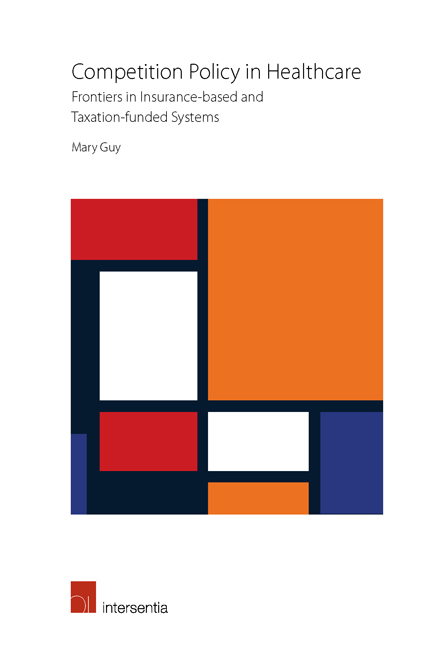Book contents
- Frontmatter
- Foreword
- Preface
- Acknowledgements
- Contents
- List of Cases
- List of Legislation
- Table of Figures
- Abbreviations
- Introduction
- Chapter 1 Competition Reforms in Dutch and English Healthcare and the Development of Competition Policy
- Chapter 2 Competition Law: Its Applicability and Application in Dutch and English Healthcare
- Chapter 3 Sectoral Regulation: The Relationship between the Competition Authority and the Healthcare Regulator in the Netherlands and England
- Chapter 4 Merger Control: Hospital Mergers, General Merger Control and the Development of ‘Healthcare-Specific’ Merger Control in the Netherlands and England
- Conclusion
- Bibliography
- Index
- About the Author
- Frontmatter
- Foreword
- Preface
- Acknowledgements
- Contents
- List of Cases
- List of Legislation
- Table of Figures
- Abbreviations
- Introduction
- Chapter 1 Competition Reforms in Dutch and English Healthcare and the Development of Competition Policy
- Chapter 2 Competition Law: Its Applicability and Application in Dutch and English Healthcare
- Chapter 3 Sectoral Regulation: The Relationship between the Competition Authority and the Healthcare Regulator in the Netherlands and England
- Chapter 4 Merger Control: Hospital Mergers, General Merger Control and the Development of ‘Healthcare-Specific’ Merger Control in the Netherlands and England
- Conclusion
- Bibliography
- Index
- About the Author
Summary
In general terms, this book has examined the applicability and application of competition law to Dutch and English healthcare, the relationship between the new healthcare regulators and competition authorities, and the modifications made to general merger control regarding hospital mergers. It has also outlined what competition policy in healthcare can look like by reference to the Dutch and English experiences, which encompass the broad typologies of the insurancebased healthcare system and the taxation-funded model. In particular, it has sought to contribute to understanding where competition law may be applied and where exemptions and modifications may be deemed necessary if a competition policy in healthcare is to be workable for benefits to materialise from competition reforms.
Over the course of writing this book and discussing initial research findings with academic and non-academic audiences (primarily) in the UK and the Netherlands, it has become apparent that competition in healthcare is a theme of interest beyond a niche issue within the confines of either competition law or health law. Thus, it is impossible to divorce competition in healthcare entirely from either general competition policy or understandings of healthcare system organisation: it draws heavily from both, so a competition policy for healthcare cannot exist in isolation.
However, the wide-ranging events which have occurred in the past six years have affected the concept of a competition policy for healthcare to varying degrees. For example, the creation of the Autoriteit Consument en Markt (Authority for Consumers and Markets (ACM)) and the Competition and Markets Authority (CMA) can be perceived as having had little impact on the development of competition in healthcare beyond this potentially being treated as less of a priority for larger agencies. Further, although proposals to repeal the Health and Social Care Act 2012 (HSCA 2012) by the Labour, Green and Liberal Democrat parties ahead of the UK General Election in 2015 (and subsequently) failed to materialise, the main impact this could have had would have been to simplify competition policy vis- à -vis the National Health Service (NHS) by leaving intact the (UK and EU) general competition regime.
- Type
- Chapter
- Information
- Competition Policy in HealthcareFrontiers in Insurance-based and Taxation-funded Systems, pp. 215 - 234Publisher: IntersentiaPrint publication year: 2019

